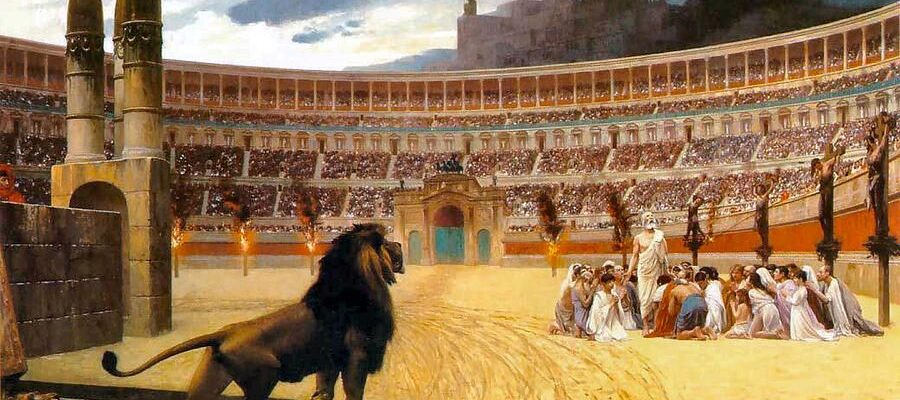The Roman Empire is perhaps the most famous empire in human history. It was not nearly the most massive (its two million square miles doesn’t even stand up to America’s four million), nor could it boast the greatest wealth, or military prowess, or population. Yet to historians, Rome dominates the stage because she lasted. Over a thousand years she lasted. Her method for taking the world by force was not to boast the largest borders only to lose them in the next generation like so many empires before her had. Instead, it was the sheer pragmatism and cunning of her leaders who set up systems of government, laws, roads, aqueducts, etc. that kept people in the empire not only because they couldn’t leave, but because they didn’t want to. And one of their genius plans that kept the disparate peoples from leaving? Religious pluralism.
Rome had her gods. But so did the Egyptians, the Persians, the Germanic tribes of the north, and the Jews. All of these people at one point had to bend the knee to Rome, but how could Rome sustain the conglomeration of cultures and religions under one banner? By permitting the worship to continue so long as the authority of the state was maintained. This was signified by swearing fealty to the emperor, or later, pinching incense on the altar to the Roman emperor. The emperor became a stand in for Rome itself. It was as if to say, you can worship whatever god you want in whatever way you like, but Rome stands supreme. Break her laws, and the worldview you have, the ethics your gods demand, matter little. For the most part, this worked. Many were happy to welcome the benefits of Roman culture and could better assimilate if they didn’t have to give up their old religious ideas.
Yet why do we hear the stories of the Christians being fed to the lions? Why not the Jews? The Egyptians? The barbarians? Though we could get into the complicated reasons, the simple answer is this: Christians could not abide religious pluralism. No, they didn’t go around forcing others into their religion or killing pagans. But they refused the basic tenant of Roman religious pluralism; they claimed Christ is above all. Christians could not, as other pagans could, acknowledge Rome or its Caesar as lord above the Lord of lords. They could not pinch the incense. They would live peaceably, but Rome understood the power of such an ideology. Religious pluralism and the exclusivity found in Christianity don’t mix.
Today we face a similar problem, though guised in different forms. Religious pluralism rules the day in the West, the descendant cultures of that once great empire. Religion is treated similarly to a genre of music or a style of fashion: pick the one that you like best, or you think works well. It doesn’t matter if you are Muslim, Jewish, Buddhist, etc. So long as you respect the laws of toleration, pluralism, and liberalism, you’ll be just fine. Yet Christianity is not tolerant: though it be peaceful in its outlook generally, its God says “thou shalt have no other gods before Me.” It is not pluralistic: Christ said that “no one comes to the Father except by Me.” And it is not liberal: Paul made no excuses for sin but condemned the wickedness of the Roman culture around him which praised aberrant sexuality. Christianity is inclusive in this fact: it calls all men everywhere to repent of their sin and turn unto the Lord Jesus Christ, who stands willing and ready to save. Yet it is exclusive in that it acknowledges no other lord.
Do we take such a claim seriously? Are we comfortable saying that Jesus is the only way to salvation? Even in the public square when people of all religions are listening? Do we call out other Christians for claiming differently? Our Lord calls us to speak the truth in love. To do so, we must surely come to the conclusion that the most loving thing to do to a mob running off a cliff is to yell at them to stop and turn around. That is the evangelistic call of the Christian, to lovingly call men to repent so that they might be saved. For after all, such were we at one point in our lives but for the grace of God Who saved us from our sins. Let us never be afraid to stand up to our culture’s new obsession with pluralism but understand that we are not so different from the Christians of Ancient Rome. No they are not yet throwing us to the lions, but America still balks at our claims that Christ is the Lord of lords, and that He does not share His throne.
-By ReFo Texan

O I’m a good old rebel, now that’s just what I am. For this “fair land of freedom” I do not care at all. I’m glad I fit against it, I only wish we’d won, And I don’t want no pardon for anything I done.






Yes Jesus is the only way to Heaven. Yes if we’re real Christians we’ll proclaim this anywhere. If we’re ashamed of Jesus He’ll be ashamed of us before His Father. Gods laws and protections and blessings are the pillars that hold up what’s left of our civilization.
What can we learn from Rome? That in order to “live” free, be safe and able to raise a family in Christ … we need a “country.” Our own country. Ruled by our kind of people that we elect and keep track of. ( Hold their feet to the fire so to speak. ) Also, that evil tyrants will look for any weakness and loop hole from which to control and bring us down. We’re not fed to lions “yet,” but there are more sophisticated ways to wipe us out. Don’t have the shot from the “next” plandemic? Then you can’t “log on” or go to any store, “etc.” That would instantly shut up ALL alt media and ALL conservative informed white Christians from spreading the gospel and the real news and shut us down economically. Guess what sheeple. That was / is the plan from the beginning.
How do we prevent this ( and 200 other evils being done to us by the NEW Romans?
Start a conversation about how to bring the restructuring of America into 4 or 5 new Republics … to a vote, AND how to “design” our new Republic ( a very enlarged all white Confederacy 2.0. )
Now be ready for push back on this by
1. Trolls who are paid well by deep state NGO’s who especially monitor sites like THIS.
2. Dummies who are ruled by “the lazy voice” inside themselves. We all have the lazy voice that tries to get us out of anything that requires effort.
Speaking of well paid trolls –
https://www.sgtreport.com/2022/03/gatekeepers-make-million-while-truthers-are-terminated-maryam-henein/
This is a very good article, and its very blunt in the way it goes about making its points.
One thing I will say though, as a Christian, is that *nobody* knows whether or not they’re saved, including Christians.
When you posit the existence of an all powerful god who can do whatever, whenever, to whomever, you must also admit, unlikely as it may be, that God could decide to *save the sinners and damn the saints* at the last minute, for no reason except “because I decided it so”. Were that to be decided upon, there’s realistically not a single thing you could do to stop it.
My own personal view is that God will recognize that, de-facto, there are many good people who’re not Christians and blah blah, all that stuff.
But its important in these instances to differentiate between one’s own personal views and what is taught by the church. My own views do not give me the authority to retroactively do away with 2k years of theology, the teachings of the church fathers, etc.
Food for thought lest anyone here get too prideful.
You can take this a step further and recognize the fact that the Byzantine or Eastern Roman Empire stood for 1200 years under the True Faith of our Lord, the Orthodox Christian Faith. This is why the west has become so tattered in it’s rank and file divisions. You hit the nail on the head with the different genres are just like different religions, but the singularity of Eastern Orthodoxy is all but lost on the west, even with the 2 other denominations of Christianity.